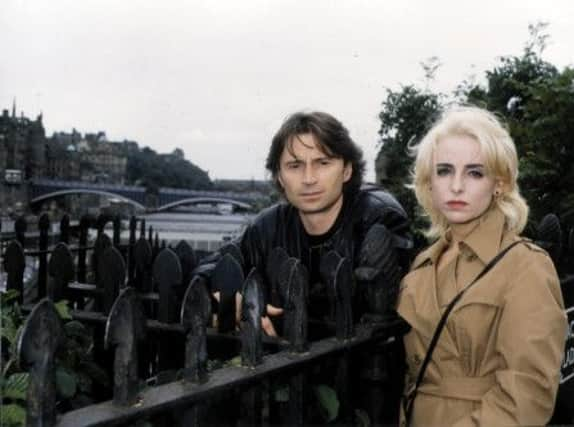Obituary: Jenny McCrindle, actress


THE actress Jenny McCrindle, who has died in Glasgow aged 46, 15 years after being diagnosed with multiple sclerosis, was an extraordinary presence in Scottish theatre and film during the 1990s, a tiny, beautiful figure who combined a fragile appearance with an extraordinary, wild and wicked sense of humour, and a huge, unpredictable gift both for comedy and tragedy.
Her screen career ranged from the 1989 television film Dream Baby with Peter Capaldi, to the 1998 television series Looking After JoJo – in which she co-starred with Robert Carlyle, and played his girlfriend, a Marilyn Monroe lookalike – and the film version of Irvine Welsh’s Acid House, released in the same year.
Advertisement
Hide AdAdvertisement
Hide AdAnd in theatre, she played a key role in realising the work of many of the leading Scottish playwrights of the period, from Forbes Masson and Alan Cumming, who wrote the parody 1987 Tron panto Babes In The Wood, in which she memorably played a bee, to Chris Hannan, Iain Heggie, Simon Donald and David Kane.
Jenny McCrindle was born in Clydebank in 1968, into a close and loving family who, according to her lifelong friend David Kane, shared a terrific sense of humour.
Jenny was the first in the family to become involved in theatre, joining the Scottish Youth Theatre in the mid-1980s and graduating rapidly to her first film, Charlie Gormley’s 1986 comedy Heavenly Pursuits, starring Tom Conti and Helen Mirren.
By the end of the 1980s, she was becoming a sought-after performer on the Scottish stage, with a rare gift for the Scottish tradition of no-holds-barred raucous comedy, built on a close rapport with the audience.
She adored pantomime, and starred in a Tron version of Sleeping Beauty co-written by Peter Capaldi and her then boyfriend Craig Ferguson, as well as in Babes In The Wood.
She also gave unforgettable comic performances in David Kane’s Dumbstruck at the Tron in 1994, and in the film version of Simon Donald’s 1992 Traverse play The Life Of Stuff.. In 1995, at the Royal Exchange in Manchester, Iain Heggie describes her as just “walking in” to a key role in his Glasgow tenement backyard comedy An Experienced Woman Gives Advice; the then 7:84 administrator Jo Beddoes said that the sight of Jenny making her entrance across the rockery, in perilously high heels, was worth the ticket price in itself.
As a live performer Jenny McCrindle was not only funny, but dangerous, unpredictable and thought-provoking. “She was very sharp, very clever, very well-informed, and a very observant and supportive friend,” says her close friend and colleague, the comedian and writer Lynn Ferguson, “but she would hide that behind this appearance of kookiness.”
“And she was absolutely off-the-wall, the perfect mixture of humour, integrity and anarchy. Doing the same theatre show every night can get quite dull after a couple of weeks. But with Jenny, you never knew exactly what would happen.
Advertisement
Hide AdAdvertisement
Hide Ad“She was never disrespectful to the script, but she was always reinventing it, always creative, always trying out something new, something daft, something that would shake things up.”
By the time of her diagnosis with multiple sclerosis in 1999, Jenny McCrindle’s short career as an actor was almost over; her symptoms were severe, gradually confining her to a wheelchair, and friends felt that she preferred to deal with her health problems in private, with the support of her family.
Yet 15 years after her last appearances on stage and on screen, friends and colleagues still find themselves laughing at the memory of an outrageously inventive, creative and original actor, who loved to party, to say what no-one else dared to say, and to overturn every stereotyped expectation that might have been attached to her tiny, almost fairy-like figure.
“With Jenny, it was never dull,” says David Kane. “I think she was happiest when she was in panto, when she was able to be a clown, use her whole body, act the goat, and simply make people laugh.”
And the playwright Iain Heggie, who also became a close friend, agrees. “As a playwright or a director, you could never really tell her what to do – yet what she did was always right.
She was very, very creative, absolutely fearless in front of an audience, and I think she needed acting. Above all, she loved to live and perform without limits; which is why what happened to her was so hard, but why we all remember her with such laughter, and such a great sense of energy and joy.”
Jenny McCrindle is survived by her parents, George and Libby, and by her sister Joanne; and she leaves behind both the most vivid memories of her stage presence, and a back catalogue of beautiful, vulnerable, fragile and funny screen performances that ensure her special and completely original place, in the story of late-20th century Scottish drama.